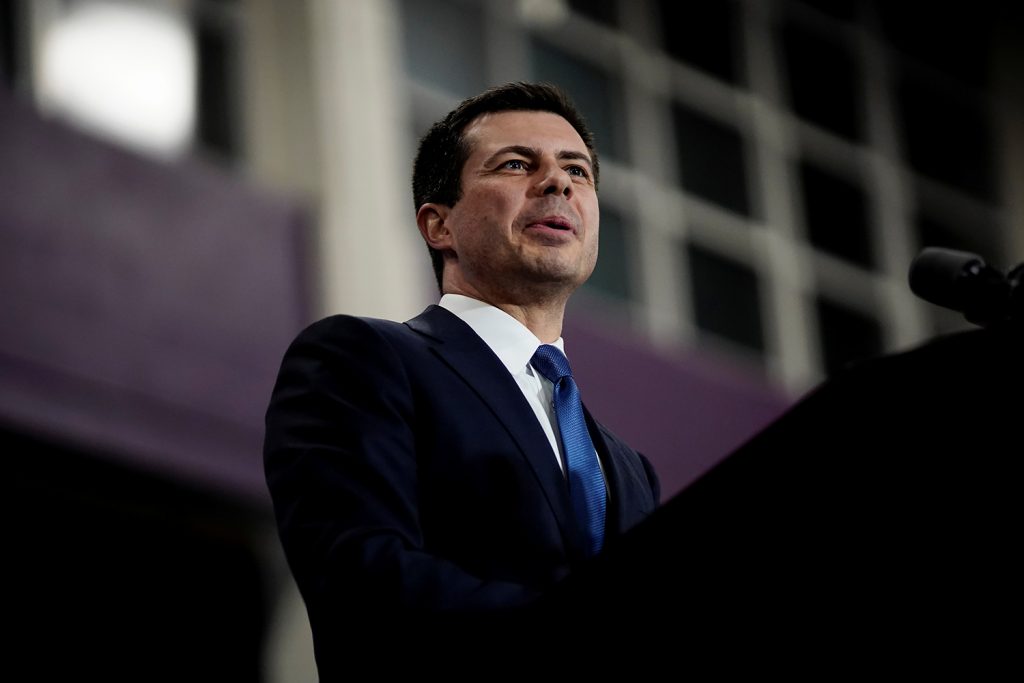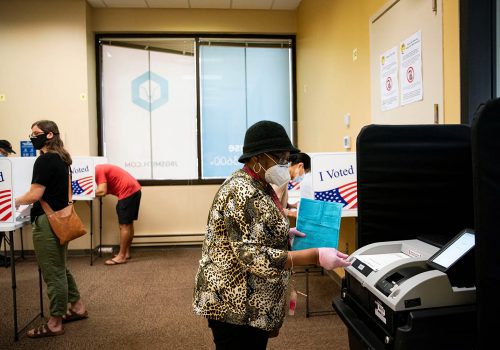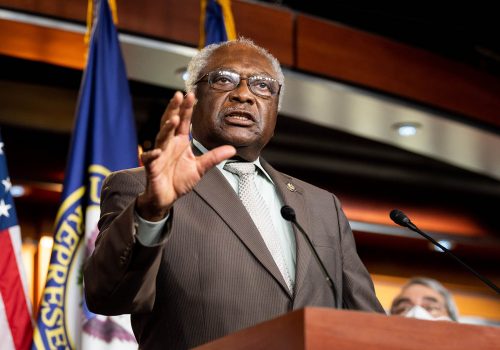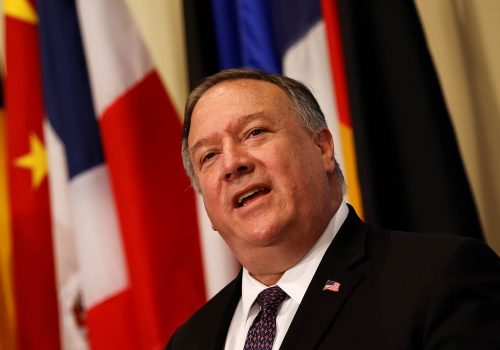The first presidential debate between US President Donald J. Trump and former US Vice President Joe Biden dealt “another body blow to American credibility” on the world stage, former mayor of South Bend, Indiana and 2020 Democratic presidential candidate Pete Buttigieg said on September 30.
“America’s adversaries, certainly anybody who is eager to see America play less of a role in world leadership, would have been rubbing their hands in glee at the chaotic scene,” Buttigieg argued. But despite the current political polarization in the United States, “it remains the case that the world needs a certain kind of American leadership—not just any kind of American leadership, but America at its best,” he said.
Buttigieg, who spoke at a virtual Atlantic Council Front Page event moderated by CBS News Senior Foreign Affairs Correspondent Margaret Brennan, explained that the focus of a future Democratic administration, should Biden win in November, would be on restoring US credibility in the world and regaining the trust of US allies. “America cannot move forward in the way that we need to without cooperation with our partners and allies around the world,” Buttigieg maintained, especially with the pressing challenges of a rising China, climate change, and the ongoing coronavirus pandemic.
Here’s a quick look at what Buttigieg said about the future of America’s role in the world as the US presidential election approaches:
Restoring credibility, without going completely back to before
- Bring back US credibility: After the Trump administration’s disagreements with allies and partners and withdrawal from institutions like the World Health Organization (WHO) and pacts such as the Iran nuclear deal, the focus of a Biden administration would be to “restore the level of credibility that the United States had,” Buttigieg said. “We are in a world where the threats have never been more interconnected,” he argued, meaning that the rest of the world needs to be assured that Washington is ready to actively participate in solutions “at a moment in which American leadership is in many ways needed more than ever.” As a first step toward rebuilding trust, the United States needs to “establish a clear set of commitments to what we will do to lead the way and what we will offer to those who partner with us,” he noted.
- Time running out: “The only way to establish trust that is really enduring is to build it up through credible behavior over long periods of time,” Buttigieg said, but he conceded that “we don’t have long periods of time” either to “establish the trust we need in the United States going forward” or “deal with the emergencies at our global doorstep, like the pandemic and climate.” That makes Biden’s long track record in foreign policy more valuable, Buttigieg argued, as his international connections can have a “calming effect that is going to be needed to recalibrate any number of relationships or regional or global dynamics that we are facing going into the 2020s.”
- Don’t revitalize the old order: Buttigieg stressed that restoring US credibility does not mean simply turning back the clock to before the Trump administration: “There is no restoring an old order that was frankly already pretty rickety as we came into the 21st century and in so many ways is not quite up to the challenge in dealing with the issues that are at hand.” While withdrawing the United States from the WHO “is definitely not the solution” to addressing the institution’s shortcomings and the influence of China, Buttigieg maintained that the organization “needed change.” Alluding to Biden’s plan to “build back better” at home after the COVID-19 pandemic, premised on the idea that “we are not just rewinding to what we had before, re-creating the same arrangements…the same weaknesses,” Buttigieg argued that the idea should also apply to “the foundations of the US presence globally.”
Watch the full event:
Countering the threat from China
- Aligning values and interests: While conceding that the approaches to China advocated by Trump and Biden may look similar on the cosmetic level, Buttigieg argued that the approaches differ fundamentally on the issue of American values. “It really matters that we be leading in the advancement of democracy and rights” globally he said, which means both keeping US democracy strong at home and making sure “China doesn’t get a pass” on issues such as the Hong Kong National Security Law and the persecution of Muslim Uighurs in Xinjiang. While Trump has taken a tough line on China, Buttigieg asserted that the administration has put human-rights issues on the “backburner…in order to get concessions in a trade war that largely wound up just getting back to the status quo ante.”
- The importance of friends: A Biden administration would also put greater emphasis on rallying allies to cooperate on addressing the threat posed by China. “The president’s America First rhetoric masks an America Alone reality,” Buttigieg argued. “One of the most important advantages we have with respect [to] China’s behavior is our network of alliances. Our transatlantic network of alliances and our global alliances.”
Modeling diversity
- Seizing the moment: US credibility has also been affected by the increasing focus on racism in US society and the demonstrations against police killings of unarmed Black Americans, Buttigieg noted, but he argued that the focus on these issues could help the United States regain its international standing. “Precisely because of the complex and sometimes dark history of racial injustice and colonization in the US,” he said, “if we could actually become the kind of country activists are insisting we could be, we would represent something in terms of the ability to have an equitable multi-racial country in the 21st century that I think would be…as dramatic a model as the arrival of America as a formal democracy in the 18th century.”
- Showing the world our diversity: A significant first step in promoting this model would be to “build representation” in the diplomatic corps, Buttigieg argued. Ensuring that the nation’s diplomats “reflect the diversity of this country…would be one way to demonstrate our awareness that it is one of our greatest strengths,” he said.
Opportunity in COVID and climate?
- Vaccine provides a leadership moment: Buttigieg also identified an opportunity for the United States to regain its leadership role amid the continued COVID-19 pandemic. The immediate challenge of ensuring that a vaccine is distributed to all the world’s countries, he explained, would be a perfect chance to demonstrate the United States’ willingness to help solve global challenges. Additionally, the pandemic has created “the most visible moment since 9/11 in which a chain of events started thousands of miles away from the US changed life in the US,” he observed, meaning that the foreign-policy community needs to engage the US public on the benefits of US leadership and “do a better job connecting the dots” and “making it clear” how global challenges affect life at home.
- The need for a national project: Similarly, the enduring threat of climate change could provide a chance to embark on a new “national project” akin to the US moon landing or the mobilization during World War II, Buttigieg said. While climate issues have become polarizing because they’re wrapped up in domestic political debates, transforming the discussion about the threat into one of positive opportunity could result in tangible progress, he explained. “Imagine if the way we felt when we were thinking about the issue of climate had a little less to do with doom and guilt and a little more to do with pride.” The stakes are high, he cautioned, as the incredible pain inflicted by the COVID-19 pandemic “may be remembered in the grand scheme of things as a dress rehearsal for climate change.”
Further reading:
Image: Democratic 2020 US presidential candidate former South Bend, Indiana Mayor Pete Buttigieg attends a campaign event in Raleigh, North Carolina, U.S., February 29, 2020. REUTERS/Eric Thayer



